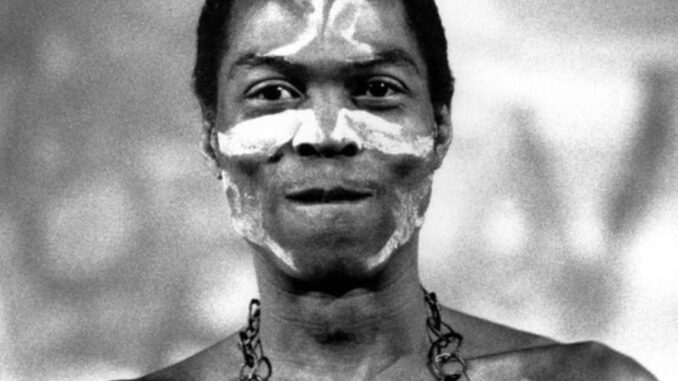
Who is the Father of Afro-Pop?
Afro-Pop, short for African Popular Music, is one of the most vibrant and influential genres in the global music industry today. It blends traditional African sounds with elements of pop, hip-hop, R&B, and dance music, creating a unique fusion that has captivated audiences worldwide. While many artists have contributed to its growth, one name stands out as the undisputed “Father of Afro-Pop”—Fela Kuti. His pioneering work in Afrobeat laid the foundation for what would later become Afro-Pop, influencing countless artists across generations.
This article delves into the origins of Afro-Pop, Fela Kuti’s groundbreaking contributions, and other key figures who have shaped the genre.
The Origins of Afro-Pop
Afro-Pop evolved from various African music styles, including highlife, juju, Afrobeat, and traditional folk music. In the mid-to-late 20th century, African musicians began blending these indigenous sounds with Western genres, creating music that appealed to both local and international audiences.
Afrobeat, pioneered by Fela Kuti in the 1970s, played a crucial role in shaping the Afro-Pop movement. His fusion of jazz, funk, and traditional African rhythms laid the groundwork for contemporary African music. Over time, artists across Africa adopted and modernized this sound, leading to the development of Afro-Pop.
Fela Kuti: The Father of Afro-Pop
1. The Pioneer of Afrobeat
Fela Anikulapo Kuti, a Nigerian multi-instrumentalist, bandleader, composer, and activist, is widely regarded as the creator of Afrobeat. His unique sound combined elements of jazz, funk, and traditional African music, resulting in infectious, rhythm-driven compositions that defined an era.
2. Influence on Afro-Pop
Although Fela Kuti is primarily associated with Afrobeat, his impact on Afro-Pop is undeniable. His fusion of African and Western sounds provided a blueprint for the genre. His innovative style inspired modern Afro-Pop artists to experiment with different musical elements, blending traditional African rhythms with contemporary beats.
3. Global Recognition
Fela Kuti’s music transcended borders, earning him international acclaim. His politically charged lyrics, stage presence, and musical genius made him one of Africa’s most celebrated artists. His legacy continues to influence Afro-Pop artists today, shaping the sound and direction of the genre.
Other Key Figures in Afro-Pop
While Fela Kuti is considered the Father of Afro-Pop, several other artists have played crucial roles in shaping the genre. Here are a few of the most impactful individuals:
1. King Sunny Adé – The Pioneer of Juju Music
King Sunny Adé popularized juju music, a genre rooted in Yoruba traditions. His use of electric guitars and modern instruments helped bridge the gap between traditional and contemporary African music, influencing the Afro-Pop movement.
2. Youssou N’Dour – The Voice of African Pop
Senegalese singer Youssou N’Dour blended mbalax, a traditional Senegalese genre, with pop music, gaining worldwide recognition. His hit song 7 Seconds with Neneh Cherry introduced African pop music to a global audience.
3. Angelique Kidjo – The Queen of African Fusion
Beninese singer Angelique Kidjo is known for her ability to fuse Afrobeat, pop, and various global music styles. Her dynamic performances and powerful voice have made her a key figure in Afro-Pop’s development.
4. 2Baba (2Face Idibia) – The Modern Afro-Pop Pioneer
Nigerian artist 2Baba, formerly known as 2Face Idibia, revolutionized modern Afro-Pop with his hit song African Queen. His smooth vocals and fusion of R&B, reggae, and traditional African sounds paved the way for contemporary Afro-Pop artists.
5. Wizkid, Davido, and Burna Boy – The New Generation
Artists like Wizkid, Davido, and Burna Boy have taken Afro-Pop to new heights. Their blend of Afrobeat, dancehall, and contemporary pop music has made them global superstars, further solidifying Afro-Pop’s place in the international music scene.
The Evolution of Afro-Pop
1. Technological Advancements
The digital revolution has played a significant role in Afro-Pop’s growth. Streaming platforms like Spotify, Apple Music, and YouTube have allowed African artists to reach global audiences, increasing the genre’s popularity worldwide.
2. Collaborations with International Artists
Afro-Pop artists have collaborated with global stars such as Beyoncé, Drake, and Chris Brown, bringing African music to mainstream audiences. These collaborations have helped Afro-Pop gain recognition beyond Africa.
3. The Rise of Afrobeats
Afrobeats, a contemporary subgenre of Afro-Pop, has become a dominant force in global music. Artists like Wizkid and Burna Boy have embraced this sound, blending it with elements of hip-hop, dancehall, and electronic music.
Conclusion
Fela Kuti’s contributions to African music make him the rightful “Father of Afro-Pop.” His pioneering work in Afrobeat laid the foundation for the genre, influencing generations of artists. While other musicians have shaped Afro-Pop’s evolution, Fela’s legacy remains unmatched.
Today, Afro-Pop continues to thrive, with artists pushing boundaries and taking African music to new heights. Whether through collaborations, technological advancements, or innovative sounds, Afro-Pop is poised to remain one of the most exciting and influential genres in the global music industry.
Stay updated with more information here!
Watch music videos here.
Leave a Reply